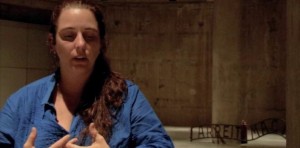EspañolOn June 7, Cuba’s political police arrested artist Tania Bruguera, along with 47 members of dissident organization Damas de Blanco (Ladies in White) and other activists, as they left their traditional Sunday Mass at the church of Santa Rita, Havana. It was their ninth consecutive week of arbitrary arrest.
Bruguera’s passport is currently in the hands of the regime, and she has been arrested on multiple occasions for calling for the freedom of the island’s political prisoners. She earned the opprobrium of the Castro regime for offering, in one of her open-air installations, a microphone which anyone could use to freely speak their minds — something which, in Cuba, is synonymous with illegal activity.
Otro domingo de terror en las calles de La Habana. Encarcelamiento y golpes para todo quien salga a manifestarse. #TodosMarchamos
— Yusnaby Pérez (@Yusnaby) June 7, 2015
“Another Sunday of terror in the streets of Havana. Imprisonment and beatings for all those that go out to protest.”
The PanAm Post spoke with the well-known performance artist about photos she published via social media after her arrest, in which clearly visible bruises cover her arms.
The conversation, frank and fearless like all her artistic endeavors, began with the much-commented upon social-media images.
marcas de represión hoy en @TaniaBruguera acompano a activistas y @DamasdBlanco #TodosMarchamos @diariodecuba pic.twitter.com/YTFGFTEuE8
— @Ailermaria (@ailermaria) June 8, 2015
“Marks of repression today on Tania Bruguera who accompanied activists and Ladies in White.”
Did you get beaten up yesterday?
I didn’t receive a beating. They grabbed me really hard by my arms. But I, personally, didn’t get beaten. One has to clarify things. They put me into a guagua [bus] with 12 other women.
Not with punches?
No. I don’t like to tell lies or exaggerate anything. I do know that for some people, yes they punched them, and one of the girls yesterday lost a tooth after being punched. It was a violent moment in the sense of contained violence, but no one punched me.
What happened yesterday?
I’m doing an investigation to see if we can propose to the National Assembly a law against state violence against those who think different ideologically.
To do this I’m doing a field investigation, going to see things that are happening. I went to witness what’s been happening to the Ladies in White for nine weeks. I wanted to see it with my own eyes.
And what did you see on Sunday?
While they were walking yesterday along Fifth Avenue, there was no problem. Afterwards, they were going down to Third, and there was a police operation, so they had to run away. I saw that they were waiting for us, there was a [police] cordon. There was an excessive police deployment.

The response they’re offering is very disproportionate. It was too much for what the Ladies in White were doing, which was not violent at all. They were marching without shouting anything, only carrying the photos of political prisoners. Passers-by were there just watching us with curiosity.
The political police made a cordon and separated the women from the men. They wanted to get me out of there, but I wanted to stay until the end; I didn’t want to miss anything. So then they began to drag me by the hair to carry me away.
Then, someone said, “Not her, not her, she’s Tania.” I then realized that there’s a difference. I believe that this difference is because they know that I don’t tell lies or exaggerate anything. I comment on things just as I see them, like I’m doing with you, in telling you that they didn’t beat me up.
I was together with the other women on the guagua, and they took us all to Tarará. There they put you in a little school-like building. They released them one by one.
Have they already freed the Ladies in White?
Yes, yesterday [June 7]. In fact, when they were releasing me I asked my guards what was going to happen to them, and they told me not to worry because they were going to take them to their homes. They told me that they do this every week.
What’s your plan for the future?
I’m working on two things simultaneously. I’m trying to inaugurate and get running in a few months the Hannah Arendt institute, which is for theoretical and practical research into art and activism.
I’m also beginning to work on a law on violence against political thinking, and for freedom of expression, so people can go out to the streets and express themselves like in every other country.
What do you think about the arrest of Cuban hip-hop artist Ángel Yunier Remón Arzuaga, AKA El Crítico?
I think it’s very unintelligent to imprison anyone for engaging in criticism at the moment of change that Cuba has arrived at. It seems to me that in fact it’s time to stop doing this, so the people understand that they can say what they think.
In any case, I don’t know why they’re so afraid, if the majority of people are in fact with the government. Nothing dramatic is going to happen if they let people talk.
What’s your position on the reestablishment of relations with the United States?
I think it’s a great idea that they reestablish relations with the United States and with the rest of the countries of the world. This is a peaceful country. I think it’s good, the only thing is that I believe they shouldn’t focus this beginning of relations on money alone.
There should also be an exchange of people, an exchange of cultures, so the country can learn from the history of civil rights, although I think the United States has a lot of problems; it’s by no means a paradise. There are a lot of problems with police brutality, with repression, and the manipulation of politics.
 Versión Español
Versión Español












